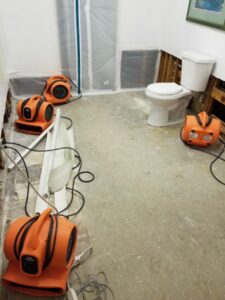How to Deal With Water Damage in Your Basement
Water damage in your basement is a serious issue that can occur at any time, and it can lead to many problems if not dealt with promptly. Some of the most common causes of basement water damage include heavy rain, plumbing issues, or even natural disasters like floods and storms.
Heavy rain can overwhelm your home’s drainage system, leading to water pooling around your foundation, and eventually, seeping into your basement. Plumbing issues such as burst pipes, leaky faucets, or faulty water heaters can also cause water damage in your basement. Natural disasters like floods and storms can cause severe water damage to your basement, leading to property damage and potential health hazards.
Regardless of the cause, water damage can lead to serious problems if not addressed quickly. It can damage your property, cause mold growth, and affect your health. Therefore, it is crucial to act fast and deal with water damage in your basement as soon as possible. In this article, we will discuss how to deal with water damage in your basement.

Water damage restoration 911 restoration
Assess the Damage
The first step in dealing with water damage is to assess the damage. You should inspect your basement to determine the extent of the damage. Look for signs of water such as wet walls, floors, or ceilings. You should also check for mold, mildew, or other signs of water damage. If the water damage is extensive, you may need to call a professional.
Remove the Water
Once you have assessed the damage, the next step is to remove the water. You can use a pump, wet vacuum, or a bucket to remove the water. If you have a large amount of water, it is best to use a pump. Be sure to wear protective clothing such as gloves and boots.
Dry the Area
After removing the water, you need to dry the area. You can use fans, dehumidifiers, or open windows to help dry the area. Be sure to remove any wet carpet or furniture from the area. You should also disinfect the area to prevent mold growth.
Repair the Damage
Once the area is dry, you need to repair the damage. This may include replacing drywall, flooring, or insulation. You may also need to repair any plumbing issues that caused the water damage in the first place.
Prevent Future Water Damage
To prevent future water damage, you should take steps to protect your basement. This may include installing a sump pump, waterproofing the basement, or fixing any plumbing issues. You should also make sure that your gutters are clean and functioning properly to prevent water from pooling around your foundation.
Call a Professional
If you are unable to deal with the water damage on your own, it is best to call a professional. A professional can assess the damage, remove the water, and repair the damage. They can also help you prevent future water damage.
In conclusion
water damage in your basement can lead to serious problems if not addressed quickly. By assessing the damage, removing the water, drying the area, repairing the damage, preventing future water damage, and calling a professional if needed, you can deal with water damage in your basement effectively. Remember to always wear protective clothing and to disinfect the area to prevent mold growth. With these steps, you can protect your home from the damaging effects of water. If you are experiencing water damage in your basement or commercial property damage. Call one of our IICRC Certified specialist today!


